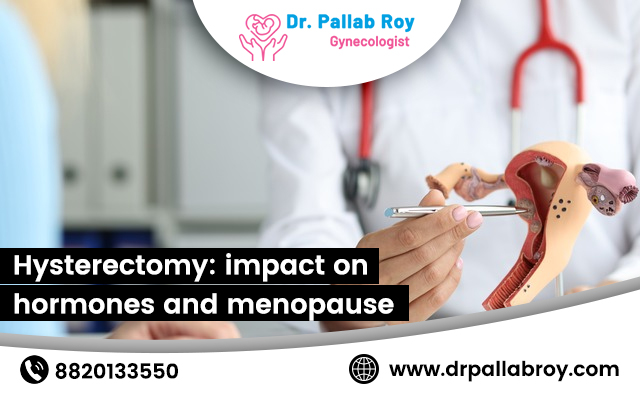Hysterectomy is a surgical procedure conducted to remove the womb or uterus from a woman’s body. Sometimes,the ovaries and fallopian tubes are also removed. It is one of the most common surgical procedures performed on women. In this blog, the best Laparoscopic Hysterectomy doctor in Kolkata has discussed how this procedure impacts the hormones in women and affects them emotionally.
What Is a Hysterectomy?
As mentioned, in hysterectomy, the uterus is primarily removed from a woman’s body. Sometimes, other reproductive organs like the ovaries and fallopian tubes are also removed, depending upon the kind of hysterectomy being performed. There are three main types of hysterectomy:
- Total Hysterectomy: In this surgery, the entire uterus, along with the cervix is removed.
- Partial Hysterectomy: in this case, only a portion of the uterus is removed, and the cervix is left intact.
- Radical Hysterectomy: This extensive surgery removes the uterus, cervix, surrounding tissues, and sometimes the ovaries and fallopian tubes. It’s typically performed in cases of gynaecological cancer.
When Is Hysterectomy Performed?
Hysterectomies are performed for various medical reasons, including:
- Uterine Fibroids: When large, painful, or multiple fibroids cause severe symptoms or complications.
- Endometriosis: In severe cases where other treatments have failed, a hysterectomy may be considered to alleviate endometriosis-related pain.
- Uterine Prolapse: A hysterectomy may be needed to correct the condition when the uterus descends into the vaginal canal due to weakened pelvic muscles.
- Gynecological Cancers: Hysterectomy is a crucial treatment for cervical, uterine, and ovarian cancers.
Before a hysterectomy is performed, a hysteroscopy surgeon in Kolkata examines the cervix and the inside of a woman’s uterus to investigate the symptoms or problems.
Hormonal impact of hysterectomy on women
When a woman undergoes a hysterectomy and her uterus is removed, it can lead to an immediate and often abrupt onset of menopause. After surgery, a woman can no longer menstruate and become pregnant. As a result, women experience a lot of changes that are commonly associated with menopause. Difficulty sleeping, urinary continence, vaginal dryness, bone density loss, night sweats, hot flashes, mood swings, irritability are some of them. Sudden menopause can also cause a sense of emotional loss in women.
In some cases of hysterectomy, the ovaries are also removed from the woman’s body. The removal of the ovaries results in a sudden drop in oestrogen and progesterone levels in the body. Oestrogen, in particular, has a wide range of functions beyond just regulating the menstrual cycle. It affects skin elasticity, bone density, and cardiovascular health. A sharp fall in the estrogen levels can cause various emotional and physical changes in women such as thinning of hair, changes in skin, sudden weight gain, breast changes, etc.
Thus, a hysterectomy can profoundly impact a woman’s hormones, leading to menopause or early menopausal symptoms in cases of ovarian conservation. The emotional toll of these hormonal changes should not be underestimated, and women should seek support and guidance from highly experienced laparoscopic hysterectomy doctor in South Kolkata to navigate this significant life transition.

